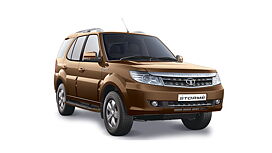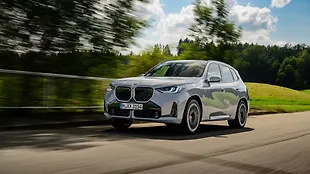Introduction

Tata had launched the Safari Storme facelift earlier this year. Along with cosmetic upgrades, Tata also upgraded the 2.2-litre diesel to produce more power and torque. Seven months down the line there is yet another engine tweak and this untimely improvement is being done for a good reason and it’s called the Hexa. Once a king of the rugged SUV segment, Tata motors have gradually gone downhill and have lost ground to their prime rival Mahindra. Dubbed the Varicor 400, the improved engine will not only give a new lease of life to the Safari Storme, but it will also come in the same spec in the soon to be launched Hexa crossover. So let’s find out how much of an improvement the Safari Storme with added power is.
In terms of design the Safari Storme remains unchanged over the recent facelift. So you get the same butch looking SUV which has truckloads of road presence. The high bonnet, imposing grille and projector headlamps lends the Storme a lot of character. At the rear the design elements are clean and minimalistic. The wind deflector(which looks more like a unibrow) and the faux air-intake mounted on the bonnet are dealership fitments and they will set you back by Rs 3800 each. Although the Safari still looks handsome, you still cant get away from the fact that it’s a 20 year old design and is now shows it age.

How is it on the inside?

Though not very modern, the Storme’s dashboard looks uncluttered and ergonomics are decent. The protruding centre console is neatly designed and the large air-con knobs are easy to use. The Music system is housed lower-down and the Harman-based unit has decent sound quality too. But it looks too basic especially when modern touchscreen systems have become a norm. The small diameter steering wheel from the Bolt looks sporty and the instrumentation is clear and easy to read. Overall cabin quality is surprisingly decent and is at par or even better than the Mahindra Scorpio.

The large front seats are accommodating and are very comfortable over long journeys. You still get the same commanding driving position thanks to the high mounted seat, low dashboard and low window line. The high seating also means getting in and out of this SUV is more like climbing up, than comfortably sliding in. The middle bench is extremely spacious and the seat itself is supportive making the Safari ideal as a long distance companion. The jump seats in the back are best not used unless there is no other option. They are small cramped and not very safe in case of a rear impact. With the seats folded luggage space is humongous and you can fold the middle row flat for added space. The Storme also comes with decent amount of features with safety features like airbags and ABS being standard on the top variants.

How does it drive?

This is where the difference lies. To bump up the power and torque figures of the 2179cc engine, Tata engineers had to strengthen the cylinder block, head, pistons, main bearings and fine-tune the injectors and the turbocharger. As a result, the 2.2-litre turbo-diesel engine now produces 153.8bhp and 400Nm of torque. Although power has gone up just 6bhp, the torque figure has increased by a massive 80Nm. Tata has mated this motor to a new 6-speed manual gearbox.

The improvements are apparent as soon as you start the car. The idle is quite smooth and vibrations are reduced too. You still experience turbo lag below 1800rpm but it doesn’t feel dead and even the turbo kicks in a pretty linear fashion. Tata has also employed shorter ratios on the new 6-speed gearbox which has reduced the number of gearshifts and has made the Storme less cumbersome at slow speeds. The additional power and a tall sixth gear also means that the Storme feels relaxed on the highway and at 100kph the engine is doing a meagre 2000rpm. The new 6-speed gearbox though a marked improvement over the older unit still feels a bit unpolished and transfers a fair amount of engine vibrations to your palm.
Our VBOX timing gear confirmed the improvements and the Varicor 400 turned out to be faster than we expected. The 0-100kmph sprint took a scant 12.9 seconds which makes it more than a second faster than the old car. In-gear times are even better thanks to the shorter gearing with 20-80kmph in third taking 10.27 seconds (3.1sec faster) and 40-100kmph in fourth coming up in 12.26 seconds (2.2 seconds quicker).

What adds to the overall experience is the Safari’s pliant ride quality. At low speeds, the Safari can easily tackle the biggest of potholes without a fuss and even at high speeds it feels stable. There is more pitching as you go faster but it never gets to the point of feeling uncomfortable. The Safari feels comfortable when driven in a relaxed manner. It's only when you drive it briskly over a winding road that you are suddenly reminded of the Storme’s high centre of gravity. It rolls excessively and over a set of corners it rocks from side to side.
The Varicor 400 variant is available in both 4X2 and 4X4 form. The one we drove was the latter and it also came with a low range gearbox which makes it quite potent when the going gets tough. During our shoot, we did some light offroading and the Varicor 400 felt more than capable thanks to its improved powertrain and shorter gearing. Obviously, a vehicle like a Mahindra Thar will be much better in this respect but still the Safari didn’t disappoint considering its enormous size and weight.

Why should I buy one?

The Storme Varicor 400 isn’t different inside the cabin or out. But the changes lie under the hood which definitely improve Tata’s ageing SUV in terms of refinement, driveability and outright performance. Priced at a hefty Rs 14.60 lakh for the top VX 4X4 variant, the Safari Storme retains its strengths as a large and comfortable family SUV but now it feels a bit too old and expensive.

Where does it fit in?

The Safari Storme Varicor 400 is directly targeted at the Mahindra Scorpio. The Scorpio is cheaper and also offers an automatic gearbox option.


























